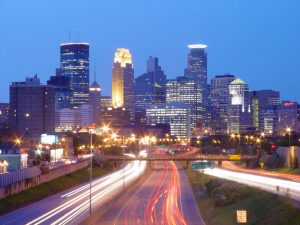What Are Average Rents In The Twin Cities?
 Sometime during the first week of every month, several research firms release their monthly report on nationwide rental market trends. While it takes some digging, you also can find numbers for the Twin Cities market.
Sometime during the first week of every month, several research firms release their monthly report on nationwide rental market trends. While it takes some digging, you also can find numbers for the Twin Cities market.
According to data from Apartments.com, as of May 1, the average rent in Minneapolis is $1340 per month. Nationwide, the average rent for a unit is $1515 per month. In other words, Minneapolis is 12% lower than the national average.
Of course, the natural question is how many bedrooms is that and in what kind of building? They didn’t say. So if you’re a small multifamily property owner, you may also want to review the resources I discussed last week before advertising a vacancy.
So, here are the specific averages:
- Studio – $1085/month, 466 sq ft
- One Bedroom – $1340/month, 664 sq ft
- Two Bedroom – $2001/month, 1019 sq ft
- Three Bedroom – $2493/month, 1216 sq ft
Apartments.com dug a little deeper, and also reported average rent per neighborhood.
The Whittier neighborhood average rent came in at $1262 per month, making it the most affordable neighborhood in the report. Loring Park at $1472 and Northeast Park at $1503 also fared better on the affordability scale.
Meanwhile, the most expensive neighborhoods were Hiawatha at $1724/month, the Mill District at $1716 and Northeast Minneapolis at $1696. Uptown, Prospect Park, St Anthony West and South Minneapolis all finished in the middle of the pack.
Here’s where it gets interesting. Apartments.com claims rents in Minneapolis have increased by 1.1% in the last year. In other words, $16/month.
Their competitor Apartment List, however, claims a figure of 1.5%. The latter also states year to date, rents in Minneapolis have already jumped 3.1%. During the same time one year ago, rents rose 1.5%
Apartment List also provides data for the Twin Cities suburbs. Their numbers found that the city of Minneapolis is more affordable for tenants, with median rent 4.5% lower than across the suburbs.
The three most expensive suburbs to rent were:
- Eden Prairie – $1649/1 bedroom, $1913/2 bedroom
- Edina – $1778/1 bedroom, $1885/2 bedroom
- Minnetonka – $1636/1 bedroom, $1875/2 bedroom
The three most affordable were:
- Brooklyn Park – $1156/1 bedroom, $1390/2 bedroom
- West St Paul – $1169/1 bedroom, $1493/2 bedroom
- St Paul – $1205/1 bedroom, $1463/2 bedroom
For their complete list of median suburban rents, click HERE.
Apartment List claims Minneapolis ranked 68th in April rent growth from a list of large U.S. cities.

